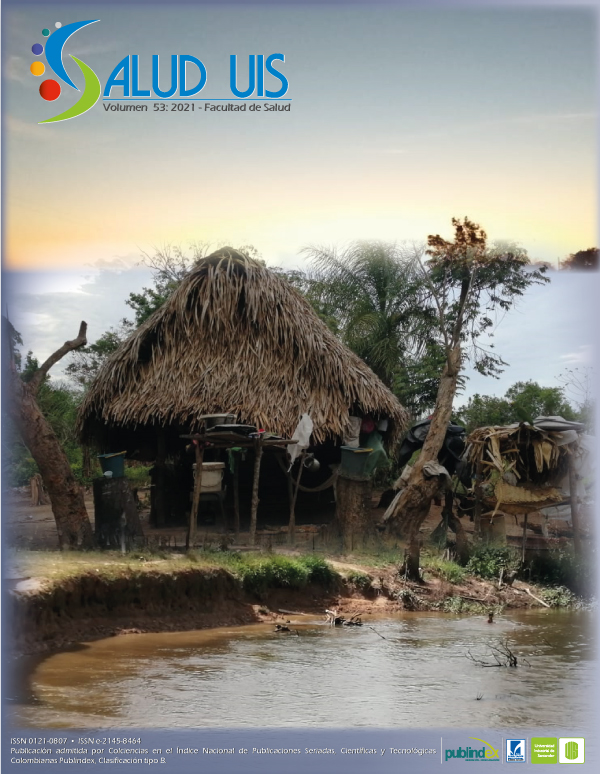Abstract
Introduction: Comprehensive sexuality education enables children and adolescents to be provided with knowledge based on empirical data, skills, attitudes, and values that strengthen their empowerment processes to enjoy their right to health, well-being, and human dignity. Additionally, it allows them to understand how to protect and guarantee their rights throughout their lives. Objective: To describe the knowledge, attitudes, and practices in comprehensive sexuality education of 6,645 school age children enrolled in eight prioritized municipalities in Colombia. Methods: Eight municipalities were selected according to its sociodemographic characteristics, and indicators of teenage pregnancy and gender-based violence. The inclusion criteria were: children going to school between nine and eleven years old and habitually residing in the municipality. A Knowledge, Attitudes and Practices survey was designed, validated and applied to 5,600 families, 50 schools and 6,645 children. A descriptive analysis of the sample obtained was carried out, delving into the data obtained from the children’s survey. Results: High percentages of disagreement regarding direct violence against women were found in children’s responses, as well as validation of subtle forms of violence. Boys received more physical punishment than girls. The term sexuality is unknown by the majority of surveyed boys and girls, those who believe to understand it have discussed it mainly with their mothers and more than 20% have not spoken about it with anyone. The participating boys and girls are initiating sexual relations at an early age without prior sexuality education. Conclusions: Girls and boys internalize and reaffirm traditional gender roles and have wrong perceptions about sexuality. That is why, to develop with them decision-making skills that will have positively influence in their life projects it is necessary to deepen the meaning of sexuality and gender-based violence.
References
PNUD. Objetivos de Desarrollo Sostenible | PNUD. Programa de las Naciones Unidas para el Desarrollo. 2018.
Barrero-Barrero D, Baquero-Valdés F. Sustainable development goals: A post-modern social contract for justice, development, and security. Rev Cient Gen Jose Maria Cordova. 2020; 18(29): 113-137.
OMS. El embarazo en la adolescencia. Organización Mundial de la Salud. 2018.
Godt S, Agyepong I, Flores W, Sen G. Una vida sana para mujeres y niños vulnerables. Centro Internacional de Investigaciones para el Desarrollo (IDRC); 2017. 125 p.
Murad-Rivera R, Rivillas-García JC, Victoria V, Forero-Martínez LJ. Determinantes del embarazo en adolescentes en Colombia: Explicando las causas de las causas. Asoc Profamilia. 2018;
UNESCO. Por qué es importante la educación integral en sexualidad. 15/02/2018. 2018. p. PG1. https://es.unesco.org/news/que-es-importanteeducacion-integral-sexualidad
Ministerio de Salud y Protección Social -MSPS. Encuesta Nacional de Demografía y Salud 2015 -Tomo 1: Componente Demográfico. Profamilia. 2015.
Profamilia - Ministerio de Salud y Protección Social. Encuesta Nacional de Demografía y Salud 2015 Tomo II: Componente de salud sexual y salud reproductiva. Minsalud. 2017.
Ministerio de Salud y Protección Social. Análisis de la línea base del Observatorio de Embarazo Adolescente en Colombia. 2013.
Instituto Nacional de Medicina Legal y Ciencias Forenses. Forensis 2017 Datos para la vida. 2018.
Departamento Nacional de Estadística DANE. Pobreza Monetaria; 2019.
DANE. Estadísticas Vitales de Nacimientos y Defunciones; 2016.
Piaget J. Part I: Cognitive development in children: Piaget development and learning. J Res Sci Teach. 2003; 40: nS1: S8-S18.
Ministerio de Educación Nacional (MINEDUCACIÓN). RESOLUCIÓN 3353 DE 1993. Revista Legislación Económica N°: 982. 1993.
Fondo de Población de las Naciones Unidas (UNFPA). Pobreza, salud sexual y Derechos Humanos. México DF; 2005.
Vargas-Trujillo, Cortés, Gallego, Maldonado, Ibarra Ávila, M P, et al. Educación sexual de mujeres colombianas en la juventud: un análisis desde el enfoque basado en los derechos humano. Serie de Estudios aprofundidad ENDS 1990-2010. 2013; 7.
Ohsako TE. Violence at School: Global Issues and Interventions. Studies in Comparative Education. 1997; 127 p.
Sauceda-García JM, Olivo-Gutiérrez NA, Gutiérrez J, Maldonado-Durán JM. El castigo físico en la crianza de los hijos. Un estudio comparativo. Bol Med Hosp Infant Mex. 2006; 63: 382-388.
Cely P. Análisis de los niños, niñas y adolescentes como sujetos de derechos. Salud Soc. 2015; 2(1): 42-47.

This work is licensed under a Creative Commons Attribution 4.0 International License.
Copyright (c) 2021 Andrea Arenas-Duque, Daniela Roldán-Restrepo, Danny Rivera-Montero, Sandra Marcela Sánchez-Molano, Juan Carlos Rivillas-García

